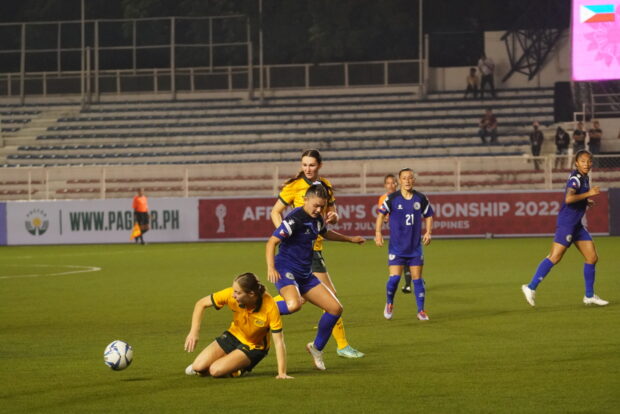Filipinas hope to use Fifa World Cup stint to boost football’s growth

A local broadcast partner to air the games of the Filipinas against the best footballers in the world would help the sport gain much more relevance here. —AFF PHOTO
The chance of being seen by a wider audience in the country through a television deal remains bleak. But the Filipinas are hoping that, somehow, their maiden stint in the Fifa (International Association Football Federation) Women’s World Cup would result in more than just getting noticed by a nation not exactly enamored of football.
“I think it just brings awareness for women’s soccer, not only in the Philippines, but worldwide,” Sarina Bolden said as part of an interview posted recently on Fifa’s official website.
Bolden and the Filipinas will have that chance to get more recognition—and relevance—next month when they head to New Zealand for group-stage matches against the World Cup cohost, Switzerland and Norway.
It would have been a perfect and dramatic milestone to broadcast on local TV but until now, local broadcasters, whose sports shows have made it a point to feature the Filipinas to generate a wider audience, have balked at paying the broadcast rights for the World Cup. That means there is a chance that the Philippines’ trailblazing appearance in one of the biggest sports spectacles won’t be aired on local TV.
Fifa’s desire to have a separate broadcast deal, compared to previous editions when the women’s tournament was bundled with the rights of the more-prominent men’s edition, is one of the reasons for the current predicament.
Japan, too
The scenario is not limited to the Philippines as Japan is also having trouble trying to secure a rights deal despite its women’s team’s reputation as one of the favorites, having won the 2011 edition.
A possible blackout in some European countries, however, was averted after an agreement was reached by Fifa and the European Broadcasting Union on Wednesday.
An 11th-hour deal here would be a welcome relief for local football fans eager to see how the Filipinas would fare against the world’s best. Otherwise, they’ll be left with having to pay for mobile data through Fifa’s streaming service or illegal sites heavy with pop-ups.
“I still talk to people today who don’t even know there’s a Philippine women’s national soccer team. So, I’m like, ‘Yeah there is.’ And before I joined, I didn’t even know. Starting from when I joined to now, more people are familiar. So it’s about the traction,” Bolden said.
“I know being in the World Cup is going to bring a lot of awareness,” she continued. “I hope the younger kids and people of all ages want to get more involved in soccer and us being on that stage is going to really help.” A local broadcast would make that goal so much easier to achieve.
